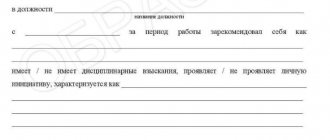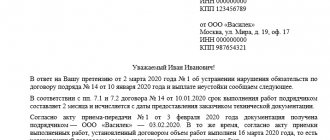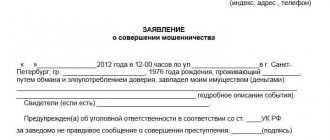- November 14, 2018
- Civil law
- Inna Makagon
A petition is a type of request. In order for a written appeal to be accepted, it must be written correctly. The document may be needed during any proceedings or will be sent to other government organizations. How do you spell "petition"? Or can the “petition” be drawn up in any form? This is exactly what we will talk about.
It is sent to the addressee and can be used when considering a case or drawing up a protocol. For this reason, it is necessary to know how to correctly compose a “request” by studying an example.
There are many sample petitions on the Internet for different life situations, but still, when drawing up such a document, a person may encounter some problems.
In addition to important information, in this article you can learn how to write a petition correctly; a sample will also be attached to each specific situation.
Why is a petition needed?
From the point of view of the law, a “petition” is understood as a request that is addressed to state bodies or other federal structures that have all the powers to consider and resolve it.
How to write a petition correctly? A sample form will be provided below. It is not only lawyers who, due to their professionalism, who, due to their professionalism, have to send such documents to various organizations, can competently draw up such an application to the court and others.
In certain situations, people also cannot do without the skills to correctly fill out an application, which may be required at any time.
For example, such a written “request” should be in the form of a letter to be sent, for example, to the education department in order for the child to be allocated a place in kindergarten.
To reward an outstanding employee, you will also need the ability to correctly present information in the application. Or, on the contrary, when penalties were applied to the employee who committed the offence, which he eliminated over time and now they need to be removed - in this situation such an appeal is also written.
Drawing up a document
The filing of the petition occurs during the hearing of the case. Sometimes this is done simultaneously with filing a claim, sometimes during and after the consideration of the case. The application is either refused or granted. The judge makes a ruling. The decision to consider the document is recorded during the hearing. If the court's decision to consider the request does not satisfy the applicant, he can appeal it.
When drawing up the document, it is important not to forget to mention the details of the proceedings and the motives that prompted the application. There is no specific form
However, many types of petitions can be found online. The most suitable one is selected from them. Based on it, you can draw up your petition.
The correct document will consist of the following points:
- the name of the court that is considering this proceeding;
- FULL NAME. the applicant, his contact information (address, telephone, email, etc.);
- FULL NAME. the defendant and his contact information (address, telephone, email, etc.);
- reasons and purposes for filing the petition;
- descriptions of the violation of the applicant's interests;
- evidence of the illegality of actions directed against the submitter of the document, or a description of the need to carry out specific procedural actions;
- list of requirements (please...);
- references to legislative norms;
- list of attached documents;
- signatures and paper submission dates.
https://youtube.com/watch?v=npob1qa3ru0%3Ffeature%3Doembed
As a rule, a submitted application is considered immediately. When the application is not urgent, a decision is made within three days. The judge must give reasons for his refusal. It can be appealed in court.
A properly drafted document cannot be left without consideration. Therefore, experts advise seeking legal assistance or clarification if questions arise about the principles of procedural treatment in court.
How to write a petition correctly
If a citizen intends to send such a document to court, then the execution has no relationship with the type of case. That is, it does not matter whether a criminal case is being considered or a civil dispute is being regulated - the petition must be drawn up in compliance with certain standards.
Options for filing an application can be different - there are a huge number of them. It can be:
- An appeal aimed at calling a witness.
- Changing the requirements of the statement of claim.
- Postponement of the court hearing.
- Invitation of a translator.
There are many options, but how to write a petition to the court correctly? The pattern can be found in the corresponding structures, copied or taken as a basis.
Possible reasons for refusal to accept for consideration
Important! The court may refuse to accept the application on the grounds that the issue is beyond the competence of the court to which a copy of the application was sent. Then it is redirected to another authority, which will extend the time for consideration of the case, or it is returned to the applicant
A similar result will occur if the filing was made by a person who does not have the right to protect the interests of the person in connection with whom the application was written. It can only be filed by persons who are included in the trial or their representatives.
A refusal awaits the applicant even when detailed violations are not indicated, as well as the reasons for which the appeal was drawn up. The document must necessarily contain this data.
If the parties have reconciled or a decision has been made by the arbitration tribunal, then filing an application also makes no sense.
Approximately the same procedure for filing applications is provided in neighboring countries, for example, countries such as Belarus or Ukraine.
Application for promotion
In this situation, how to write a petition correctly (a sample petition is given below)? Various situations may arise at work when an employee needs to be rewarded or disciplined. You can launch these procedures by correctly writing the appropriate “request” to higher authorities. Each organization has its own rules of business etiquette - they will influence who draws up this document.
In most situations, this responsibility falls on the shoulders of the HR department. But it happens that the responsibility is shifted to employees who will receive bonuses or deductions.
In this situation, no one can guarantee that the personnel employee will provide a correctly drawn up example of a petition that will correspond to the current situation.
Therefore, it is necessary to look for a sample application in advance. We’ll tell you in this article how to correctly formulate a request that will help you avoid problems and endless document editing. To do this, you just need to consult with a competent lawyer and find a sample document.
If the petition concerns bonuses for an employee, it is usually addressed to the main manager of the organization. You can make a written request in free form, but there are a number of nuances that should always be taken into account.
At the conclusion of the petition, it is necessary to briefly outline all of the above. At the end of the document it is indicated - “reward”, “transfer to a higher position”, “recover”.
When is it required?
Through a petition, many issues are resolved that cannot be resolved without authoritative intervention and the issuance of an appropriate order (instruction):
- seeking assistance from all judicial and administrative authorities;
- all appeals to the Constitutional Court;
- obtaining information, information, documents;
- in the form of a petition, a request for assistance addressed to the head of the organization or unit is submitted;
- initiation of incentives, penalties, pardons, etc.;
- initiation of enforcement proceedings (Federal Law No. 229 OIP 2007/02/10 edition 2016/28/12);
- recognition of the fact of bankruptcy through the Arbitration Court (Federal Law No. 127 2002/26/10 edition 2016/03/07 art. 42);
- resolution of everyday issues of private individuals at the municipal level (children's institutions, banks, housing and communal services, social security, medical services, migration and citizenship).
The request for assistance should be directed to the person authorized to resolve these issues. Otherwise, time will be wasted and a refusal with the wording “out of competence” will be received.
Before writing a request to carry out certain activities (for example, a requirement for calligraphy examination in a labor dispute), you should make sure of the relevance of the requested action. Sometimes it is more reasonable to make a statement about the falsity of the evidence or file a protest than to pay for the procedure without the possibility of reimbursement.
What is a letter of petition?
At its core, such a request is no different from a regular petition, since the details, design style, and form remain the same.
There is one difference - in the name. It is believed that the letter of petition received its name because in many situations it is sent to the addressee by mail. Although a regular petition can be sent in the same way.
“Letter of petition” refers to requests that are related to everyday issues, among which are the following:
- Rewarding employees in a situation where the employee himself desires it.
- For example, such a written appeal can also be made by a hospital patient in relation to an employee who, when providing assistance, showed his professional suitability at the highest level.
- Admission of a child to an educational institution that is not located at the place of residence.
- Applying for a loan. Some banks require that the future borrower bring a certain application from work.
Administrative process
At the stage of preparing the consideration of the case, the judge examines all the submitted petitions, decides which ones to reject or accept, focusing on articles No. 24.4, No. 29.1 of the Code of Administrative Offenses of the Russian Federation.
Officials have the right to submit an appeal during the meeting.
Directions of the application:
- calling a new witness;
- appointment of examination;
- adding new/excluding old case materials;
- direction of proceedings at the place of registration.
Requirements
In some situations, a request template is not needed at all - you are allowed to present your arguments in free form. But do not forget about the official business style in circulation; it is not recommended to resemble colloquial and literary words, since this is still a document.
It is not recommended to ignore the standards:
- In the upper right corner of the letter you need to indicate the addressee.
- The “request” must begin with an official appeal.
- Availability of personal information of the citizen.
- If necessary, it is important to leave a link to regulatory and legal documents that support the arguments of the petition.
There are cases when a letter of request must be in a certain form. In this situation, a sample can be requested from the organization. There are no official templates at the state level, and for this reason, each organization has the right to establish its own standards and require compliance with them.
It should be noted that if a person makes certain deviations from the form accepted in the institution, then this fact cannot be considered a basis for invalidating such an appeal.
But it’s still better to use the “famous” sample to save nerves and time for disputes that may arise.
How to choose an application format
If a citizen is puzzled about how to write a petition, a sample can be downloaded from the official website of the desired department. To determine the format, you need to pay attention to a number of points:
- Study the sample petition and see if it contains references to by-laws, as well as resolutions.
- If such links exist, it is important to know whether they are relevant or not.
- Study the specific legislative norms that are in the example. It may be that they changed during the search.
In any situation, you should initially figure out whether a particular sample or template is considered relevant at the time of the search. You need to know that when searching for an example of a petition, it is wiser to use several sources. This applies to any subject of the “request” and the addressee.
Request for return of claim
If a citizen (plaintiff) changes his mind about suing, you can submit a request for the return of the claim.
True, in order for the court to satisfy it, it is important to comply with certain conditions. An appeal for the return of a statement of claim must be submitted in writing. It must be submitted before the court initiates legal action.
Information about the fact that such a determination was made by the court must be clarified in the office where the claim was submitted. This can also be done on the official website of the court. A citizen can contact the assistant judge and indicate his intention to submit a written appeal before a ruling is made to accept the claim. This occurs within five days from the date of receipt. Therefore, the plaintiff also has such a period for withdrawal.
An example of the text of a petition is quite simple. It is necessary to indicate a request for the return of the statement of claim in accordance with Art. 135 of the Civil Procedure Code of the Russian Federation. Indication of reasons is not required and is provided at the request of the judicial authority. You can submit a written request through the office. The article examined a sample petition. You already know how to write it correctly.
See the topic - Petition to the traffic police and the court in questions and answers. Sample, terms and rules
A petition in administrative law is submitted to an official (traffic police officer) or a judge in order to request something. And this document has many subtleties on which the success of its consideration depends.
In the article we will look at what they are, why they are needed, how to declare them correctly, and we will learn that the filing deadlines are, in fact, very short. We will definitely provide a sample application and an example of filling it out and much more.
What is a petition and what is it regulated by?
At its core, a petition (hereinafter also referred to as “hoda”) is a request. It is declared in writing to the traffic police inspector on the road or to the judge who is considering the case. The procedure itself in the legal community is called a “petition.” That is, the person submitting it petitions for something - asks for something from a traffic police officer or a court.
It is not a complaint - you should not write in it about illegal actions, or describe the current situation - whether you are subject to a fine or deprivation of your license or an accident. It is this petition – which one – that determines the type of this document, which we will talk about below.
As of 2021, only one normative act regulates it - article 24.4 of the Code of Administrative Offenses of the Russian Federation.
What types are there?
The type of petition depends on what exactly you are requesting in writing. And their list is not established by law - in fact, you can apply for anything.
But the most common types are:
- a petition to consider the case in the absence of the plaintiff (in civil proceedings - for example, after an accident),
- about consideration at the place of residence,
- about hiring a lawyer,
- on the restoration of missed deadlines for appealing the decision,
- to restore the missed deadline of 20 days to pay the traffic police fine at a discount,
- on the postponement of consideration of the case due to the personal circumstances of the person involved or another person (witness, understandable),
- on the inclusion of evidence in the case materials (video recordings from the recorder or external cameras, witness testimony and other data),
- about familiarization with the case materials,
- on imposing a minimum punishment (when the sanction of the Code of Administrative Offenses of the Russian Federation provides for a range of punishments - for example, in the form of a fine of 5,000 rubles or deprivation of rights),
- on reducing (reducing) the fine if the standard of punishment provides for a “fork” of amounts (for example, a fine for driving without a license is from 5 to 15 thousand rubles, and the traffic police inspector on the road sets the maximum amount),
- on replacing punishment with a warning or verbal reprimand,
- on the appointment of an examination on the circumstances of the case,
- on deferment/installment payment of a fine (submitted to the judge),
- about summoning witnesses to court,
- about the possibility of videotaping or audio recording in the courtroom,
- a petition from the prosecutor to seize property within the framework of the court.
Application form, sample and examples
The petition does not have a specific approved form or sample. The document is written in free form by hand with a pen, pencil, marker - anything of any color. The main thing is that it contains your signature, indicates who it is being sent to, and is legible. Otherwise, you will simply be denied its satisfaction.
But the main thing is that if you need to write it to a traffic police officer on the road, then this must be done very quickly.
Therefore, we strongly recommend that you print out the so-called “fish” - all the necessary basic data, and fill out the essence and to whom it is sent on the spot.
Below we will provide a general sample of a petition and then you will learn what to write for each type and why there is so little time to submit this document.
General sample
So, the application must indicate:
- to whom and from whom it is declared (cap),
- what is being stated and on what basis,
- the petition itself (text of the petition),
- signature and date of submission of the document.
This is what a typical example of a “fish” petition looks like without its essence stated:
Here is a correctly completed sample of this form:
Download the application form for printing in DOCX format. Or the same form in PDF format.
We gave an example of a “motion” to postpone the consideration of a case due to the need for legal assistance in the form of a defense attorney or attorney. Now let's look at the other most common statements in this document and provide samples and examples of each of them.
Attention! We will provide samples of filling out only the essence (as well as a complete sample of this petition in the form of a file), since the header, preamble and places for signatures and dates are the same everywhere.
Sample on attaching video recordings or interviewing witnesses
Everything is very simple here. We write that we demand that our video (or audio) evidence be included in the case materials or indicate the presence of witnesses. And we write on the basis of why this needs to be done:
Based on parts 1 and 2 of Article 26.2 of the Code of Administrative Offenses of the Russian Federation, I ask you to attach to the materials of the case against me and study the video recording from my DVR in order to determine the degree of my guilt.
On imposing a minimum sentence or replacing a sentence
It's even easier here. We need to indicate that there are mitigating circumstances (if they really exist) and not aggravating ones, and based on this, apply the minimum sanction of the Russian Code:
- a fine instead of deprivation of rights or administrative arrest,
- replacing a fine with a warning,
- assign a minimum fine for “fork” amounts.
Based on Articles 4.2 and 4.4 of the Code of Administrative Offenses of the Russian Federation, I ask you to apply the minimum sanction of the norm (assign a warning) provided for in Article __, Part __ of the Code of Administrative Offenses, due to the absence of aggravating and the presence of mitigating circumstances in the form of such and such.
About oral comments
But in certain cases - if the violation did not lead to harmful consequences, if the violator has no fines - an oral reprimand may be assigned. This is possible if the violation is insignificant on the basis of Article 2.9 of the Code.
Based on Article 2.9 of the Code of Administrative Offenses of the Russian Federation, I ask you to recognize my administrative offense as minor and limit myself to an oral remark.
- Download the oral comment request form.
- Sample in PDF.
Petition to restore the fine discount period
Such a document is submitted after a decision is made in connection with missing 20 days, if the letter with a copy of the fine took longer, and therefore the car owner is not to blame for missing the deadline.
“__” __________ 20__, resolution No. _________________________________ was issued against me. I received a copy of this resolution “__” ____________ 20__.
Meanwhile, part 1.3 of Article 32.
2 of the Code of Administrative Offenses of the Russian Federation provides that if a copy of the resolution imposing an administrative fine, sent to a person held administratively liable by registered mail, was received at his address after the expiration of twenty days from the date of such resolution, this period is subject to restoration by the judge , the body or official who made such a decision, at the request of a person held administratively liable.
Based on the above, I ask you to restore the missed deadline for paying the fine at a discount through no fault of mine.
On familiarization with the case materials
This right in 2021 is given by Article 25.1 for the person against whom the case is being conducted and 25.2 for the victim.
Your proceedings contain the case materials regarding me.
In accordance with the above, I ask you to provide me with these case materials for review, or provide copies of these materials.
Please notify me about the opportunity to review it at my permanent registration address.
Samples of other types of petitions are written in a similar way. Here it is only important to understand that if a case has already been initiated and you know its details (case number, resolutions, etc.), then they must also be indicated in the appeal. It is also advisable to indicate on what basis you are applying for this or that.
Is there a petition to cancel a sentence?
Yes, but only if we are talking about assigning an oral reprimand due to the insignificance of the administrative offense.
But there is no point in writing in the “movement” that you are innocent, about your rights being violated by a traffic police officer, about an incorrect investigation and the abolition of liability on these grounds. All this is done directly during the consideration of the case when interviewing you as a violator. If the decision has already been made, then you need to appeal it.
Who can apply to whom?
The petition can be submitted by any participant in the process or case to the person considering the case: a judge, an official.
Please note that Article 24.4 expressly states that this document can only be filed during the proceedings.
If, for example, a road inspector has already issued a ruling, he may legally refuse to accept additional requests. The only exception is a petition to restore the missed deadline for paying a fine at a discount (Part 1.
3 of Article 32.2 of the Code of Administrative Offenses of the Russian Federation) - it is submitted after the fine has been issued and received by mail to the owner of the car.
Thus, not only the person held accountable, but also other participants in the administrative case can apply:
How much does it cost?
The application is not subject to state duty or other fees or taxes. It is absolutely free for any driver, pedestrian or other road user who declares it.
Is it possible to make an oral request?
No. The Administrative Code directly prescribes that it must be exclusively written. Any oral petition will not be accepted by the police officer or the judge, whether it is recorded on video or audio recording.
How and when to write?
As we mentioned above, the petition must be submitted exclusively during the consideration of the case, unless we are talking about restoring the missed period for the discount on the fine.
The procedure for considering a case by a traffic police inspector on the road according to the law is as follows:
- In essence, an administrative case is initiated by a protocol,
- and the consideration ends with the issuance of a decision.
And the subtlety is that the Code of Administrative Offenses gives officials the right to make a decision without drawing up a protocol, and if the driver disputes the violation, draw up a protocol after issuing a fine. Thus, a conflict arises when the petition must be submitted before the decision is made and the difficulty is to have time to do this. And this is a big flaw in the Administrative Code.
For example, a driver is stopped by a traffic police officer with some violation, demands documents and checks them. Then he begins to write the resolution. And before he puts his signature on it, you need to have time to write a petition (about transferring the case materials to the place of residence, about attaching the registrar’s record, imposing a minimum sentence, and so on).
What if I don't have a piece of paper and a pen?
Neither the inspector nor anyone else has an obligation to provide them to you.
That is why we recommend that you prepare your petition in advance so that the general data is already written on a piece of paper, and all you have to do is enter the name of the employee or judge and the very essence of the petition - what you are asking for.
What are the review deadlines?
There are none, from the word “at all”. The deadline for consideration of an application in 2020 is not regulated by any law or other legal act.
But there are deadlines for consideration of the case:
- if it is considered by a traffic police officer, then the period is 2 months, after which the official is obliged to issue a decision or determination of refusal,
- if the case is considered by a judge, then this is already 3 months.
During this entire period, petitions from the parties to the case are subject to consideration. But the case itself cannot be considered without studying such “moves”.
Will I be satisfied or denied?
It depends on what exactly you are asking for, how and on what basis. But there are general rules. Refusal is only possible if motivated - that is, if a judge or inspector refuses to satisfy a request, they must legally explain why. If you ask for what the law provides you with, then they cannot refuse you.
In addition, depending on the types of “moves” there is a different probability of satisfaction:
- requests for legal assistance are rarely denied, since this possibility is prescribed by the Constitution, and employees are severely punished for violating it,
- if you ask to consider the case at your place of residence, then they may refuse, citing the fact that transferring the case to another city, district, region, and so on will interfere with a comprehensive study of the materials,
- when “moving” to impose a minimum sentence, replacing one sanction with another within the norms of the Code of Administrative Offenses of the Russian Federation, or issuing an oral remark, everything depends on the factors prescribed in the legislation and the prevailing judicial practice March 25, 2021,
- the situation is similar when applying for the restoration of the discount period on the fine - if you actually received a letter with a traffic police fine after 20 days from the date of the decision, then satisfaction will not be denied,
- nor has the right to refuse to admit your evidence or attract witnesses.
Petition to call witnesses
A “request” to invite witnesses must be made in order for them to be invited and heard at the court hearing. The judicial authority will not call witnesses on its own. A sample of how to correctly write a petition to call witnesses is also provided to the citizen. It is best to make the appeal in writing so as not to forget certain requirements for the content of the petition, which are provided for by the Civil Procedure Code of the Russian Federation. The petition can be made orally.
A “request” to call witnesses can be made at any stage of the case. You can attach a written appeal to the claim when submitting it to government agencies.
Tip 3. Declare challenges correctly
There is a common opinion that if a person participating in a case does not like the judge presiding over the court session, then such a judge can be challenged and the judge will be replaced. This is wrong. The Code of Civil Procedure of the Russian Federation contains an exhaustive list of grounds for disqualifying a judge. The following circumstances are recognized as such (Article 16 of the Code of Civil Procedure of the Russian Federation):
- during the previous consideration of this case, the judge participated in it as a prosecutor, court secretary, representative, witness, expert, specialist, translator;
- the judge is a relative or relative of one of the persons participating in the case or their representatives;
- the judge is personally, directly or indirectly interested in the outcome of the case, or there are other circumstances that cast doubt on his objectivity and impartiality.
However, an application for the challenge of a judge considering a case alone is considered by the same judge whose challenge was filed. In practice, this leads to the fact that any practicing lawyer will confirm that requests for recusal are almost never granted by judges. At the same time, if a participant is sure that there are grounds for challenging a judge or other participant in the process, he should file a challenge.
FORMS
Application for challenge of a judge on the basis of Part 1 of Art. 16 Code of Civil Procedure of the Russian Federation Application for disqualification of a judge on the basis of Part 2 of Art. 16 Code of Civil Procedure of the Russian Federation Application for challenge of a judge on the basis of Part 3 of Art. 16 Code of Civil Procedure of the Russian Federation
Other forms
A refusal to challenge a judge is not subject to appeal, however, your disagreement with the judge’s decision to refuse a challenge can be stated in an appeal against the final judicial act in the case. A complaint against the actions of a judge can also be sent to the chairman of the court, who must consider it (Article 22 of the Federal Law of March 14, 2002 No. 30-FZ “On the Bodies of the Judicial Community in the Russian Federation.”
On similar grounds and in the same manner as challenging a judge, the prosecutor, court secretary, expert, specialist and translator are challenged.
An application for recusal must be made in writing. And if the grounds for challenge became known during the court hearing, the challenge should be announced orally and immediately after such grounds were revealed. If the case is resolved without considering the issue of recusal of the person who was subject to recusal, or of the judge, without clarifying the issue of the grounds and necessity of recusal, the court’s decision will most likely be illegal.
In those cases where, in the opinion of a person participating in the case, the court violates the rights of the participant, but no grounds for disqualifying the judge are seen, it is possible to file objections to the actions of the presiding judge. If such actions of the judge presiding at the court session occur directly during the consideration of the case, objections are made orally. In this case, objections are recorded in the minutes of the court session ().











